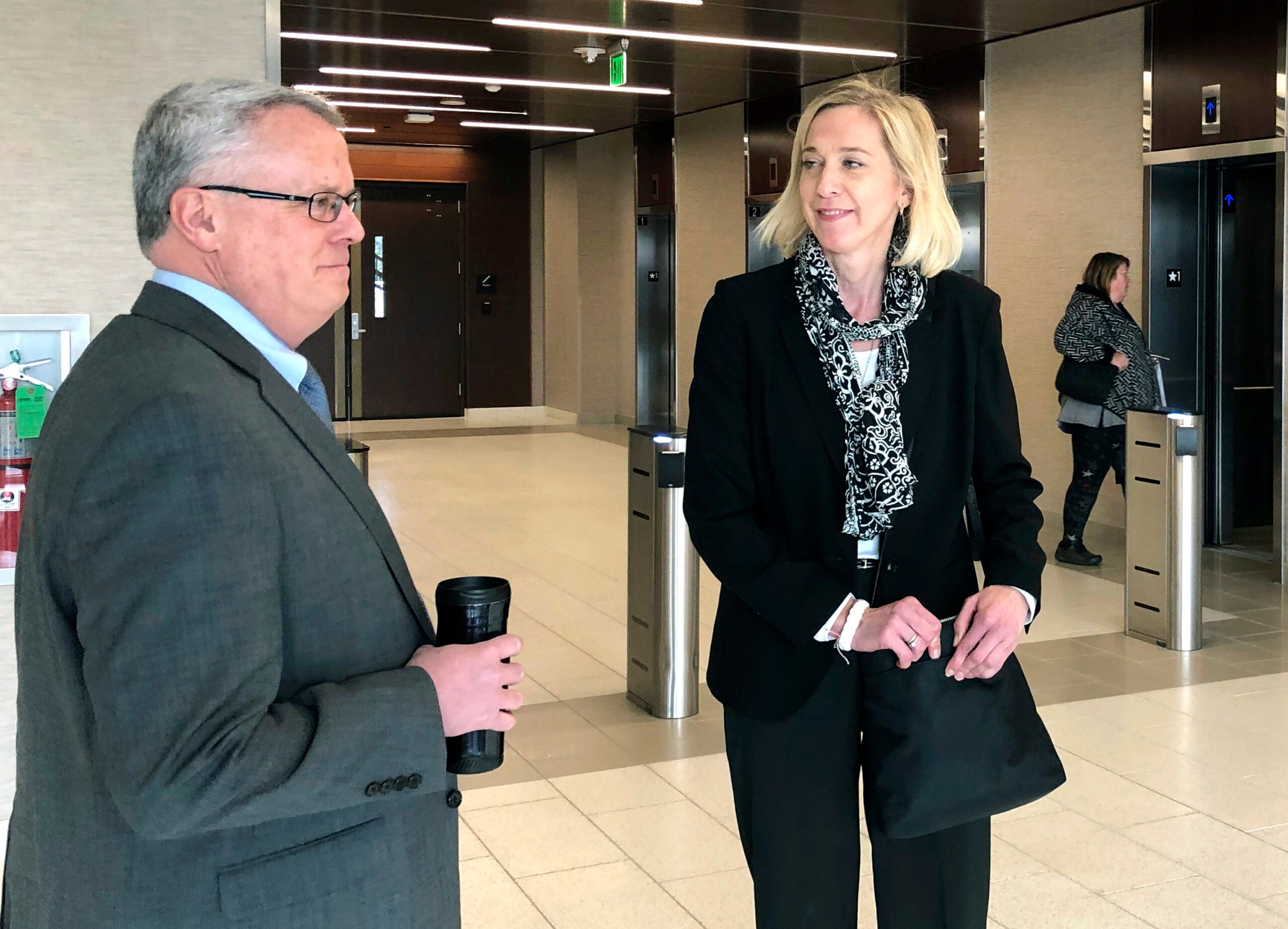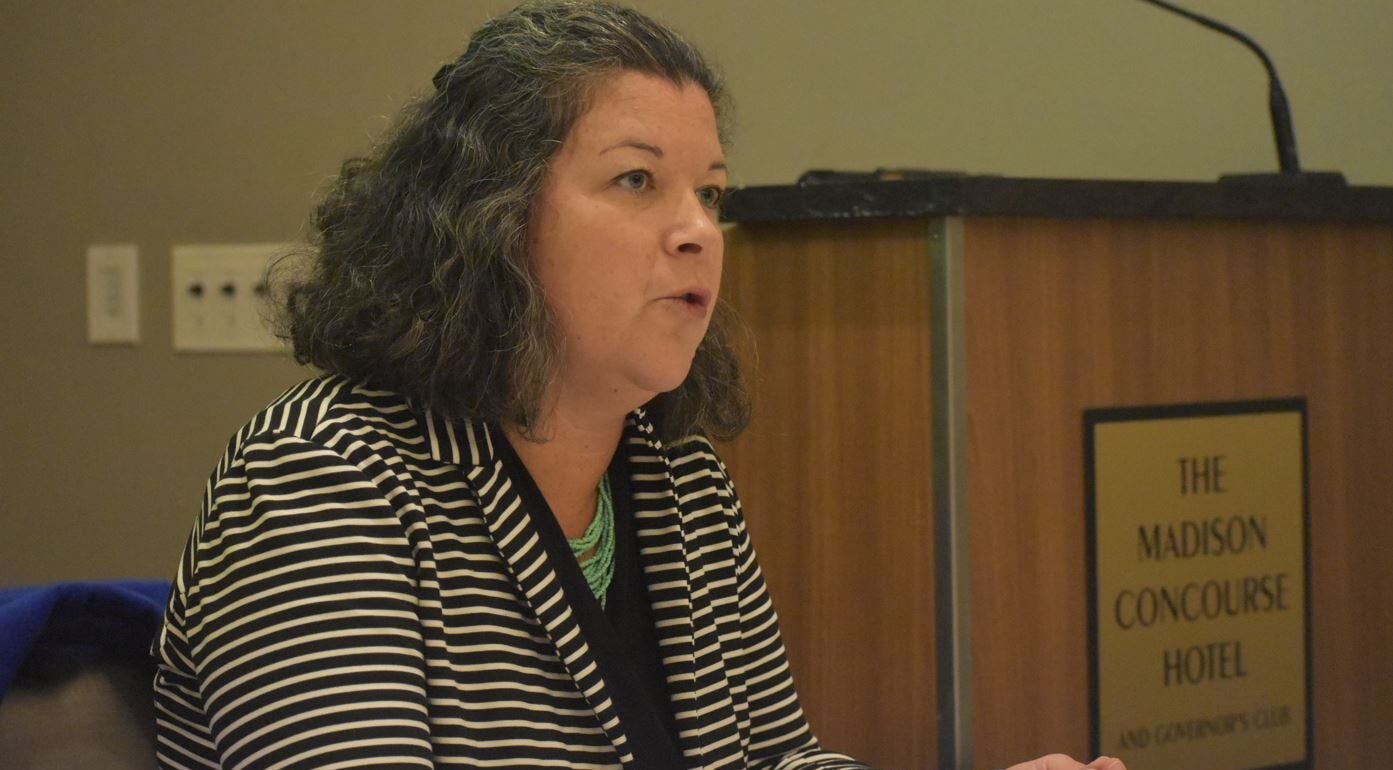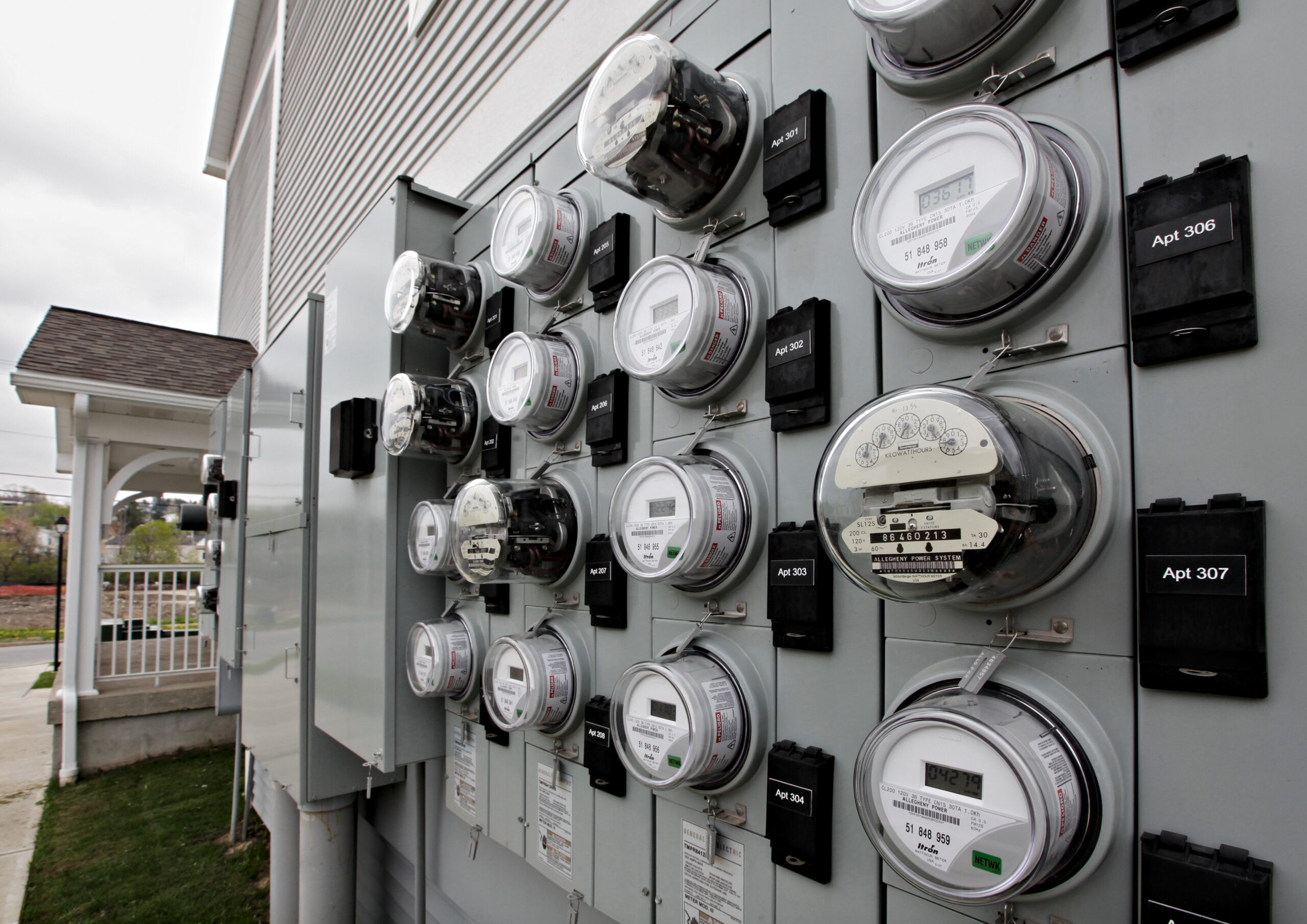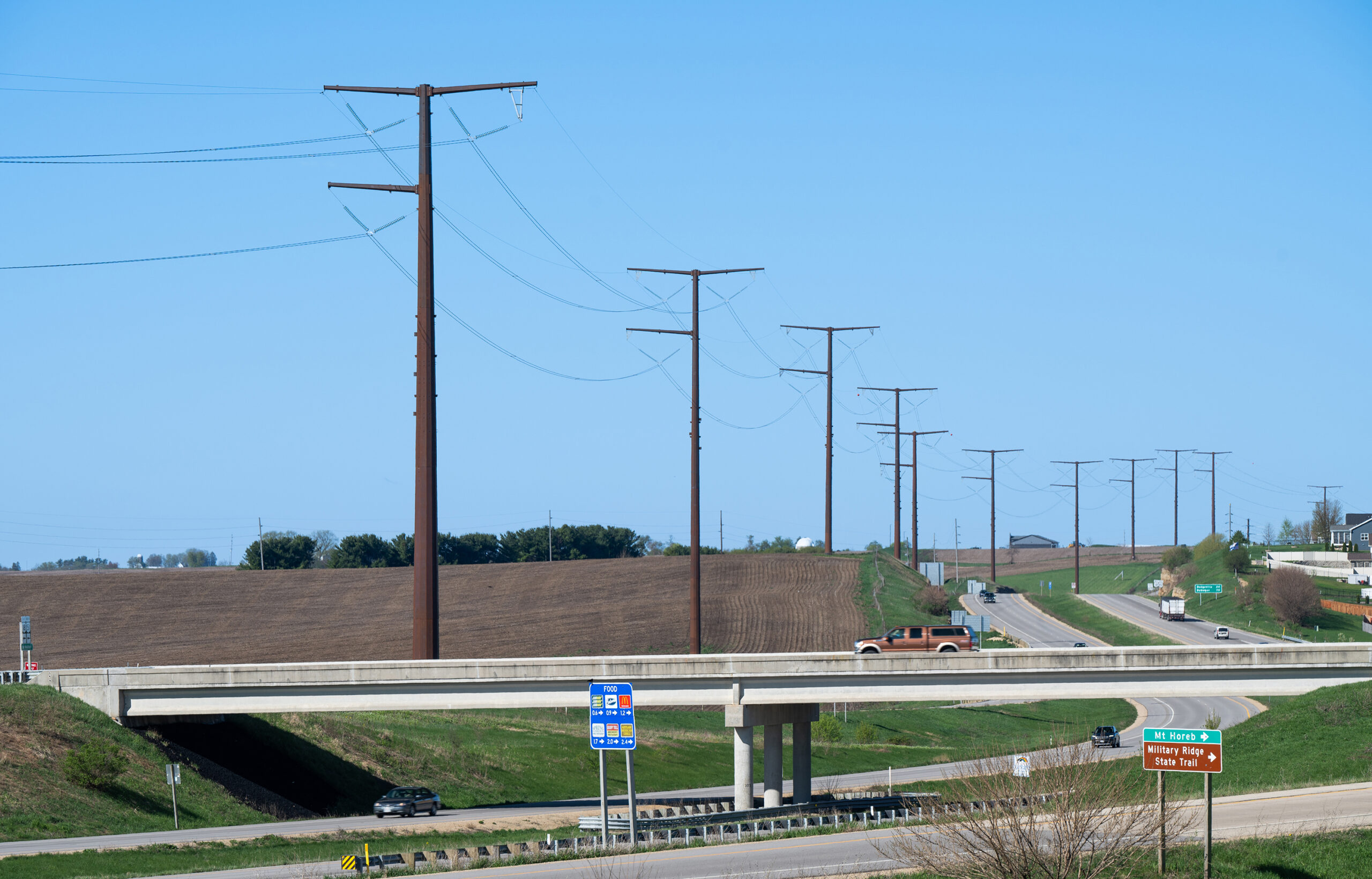A former Wisconsin utility regulator now works for a company she was once charged with regulating.
It’s the latest in what utility watchdogs describe as a “revolving door,” both in Wisconsin and across the country, of regulators working for utilities after their time in public service.
Ellen Nowak was appointed to the Public Service Commission of Wisconsin, or PSC, by Gov. Scott Walker in 2011, and reappointed to the commission in 2018. Last week, American Transmission Co. — a multi-state, transmission-only utility — announced that Nowak had joined the company as the vice president of regulatory and government affairs.
News with a little more humanity
WPR’s “Wisconsin Today” newsletter keeps you connected to the state you love without feeling overwhelmed. No paywall. No agenda. No corporate filter.
American Transmission Co., or ATC, is owned by utilities, municipalities and electric cooperatives. Those include Wisconsin-based utilities like Alliant Energy, Madison Gas & Electric and WEC Energy Group, the parent company of Wisconsin Public Service and We Energies.
Nowak did not respond to requests for comment. But in a statement, ATC spokesperson Alissa Braatz said Nowak’s “extensive background” in regulatory matters and the utility industry will help the company “achieve its mission to strengthen the regional electric grid for the benefit of all energy consumers.”
Nowak’s term with the PSC ended in March, and state law prohibits her from appearing before the commission within 12 months of her departure. A PSC spokesperson declined to comment about ATC’s recent announcement.
Tom Content is the executive director of the Citizens Utility Board of Wisconsin, a nonprofit that advocates for ratepayers. He said Nowak’s new role underscores the challenges facing the customer side of the regulatory process.
“There’s a revolving door challenge with regulators going to work for utilities — it’s not the first time that’s happened, it won’t be the last, I’m sure,” Content said. “But it really does highlight that utilities have influence, access and power.”
Since 1996, at least five former PSC officials have gone on to either work for utilities directly or to work for law firms that represent utilities or help them with regulatory filings, according to the Wisconsin State Journal.
Additionally, former PSC chair Mike Huebsch, a Walker appointee, applied for a job with Dairyland Power after voting to approve the Cardinal-Hickory Creek transmission line, which Dairyland was helping to build. And current PSC chair Rebecca Cameron Valcq, appointed by Gov. Tony Evers in 2019, has faced criticism for previously serving as a regulatory attorney for We Energies.
The “revolving door challenge” Content described isn’t unique to Wisconsin. A study this summer from Brown University examined public utilities commissions across the county. It found that of 473 commissioners, 50 percent went on to either work for one of the industries they regulated or work in an industry-adjacent role after leaving utility regulation.
Karlee Weinmann is a researcher for Energy and Policy Institute, a clean energy advocacy group and self-described utility watchdog. She said when former regulators take jobs with utilities, it raises questions about how faithfully they were upholding their responsibility as a regulator to protect the public interest versus protecting the interests of the companies.
“Best case scenario, you have folks who know the regulatory system well and know the state’s policy goals well, who are then positioned to apply them from inside utility companies and related entities,” Weinmann said. “You really have to look at the way those individuals operated during their time on the commission to see if they’ve earned the benefit of the doubt there.”
Last year, Nowak testified to the state Legislature in support of a bill that would block competition for development of new transmission lines. ATC was also in favor of the bill, which would have allowed owners of transmission lines to build lines that connect to their existing ones, preventing competitors from trying to get the work.
In her testimony, Nowak said she was not testifying on behalf of the PSC, but praised the legislation for protecting the state’s ability to have a say in who owns and maintains transmission infrastructure.
“Wisconsin residents and businesses have a reliable transmission grid due, in large part, to the system we have in place now,” Nowak said.
The bill failed to pass last year, but Weinmann said Nowak’s testimony in favor of a bill supported by her future employer “should raise some eyebrows.”
“There has been remarkable alignment in the former commissioner’s arguments and reasoning and the rhetoric used by utilities,” Weinmann said. “She certainly hasn’t been shy about promoting utility interests throughout her tenure on the Public Service Commission.”
But in a February podcast interview, Nowak said she hoped her legacy at the PSC would be that she was thorough with her decisions.
“I really did take to heart all the parties’ sides and all the information,” she said. “I hope that is something that I’m remembered for, being thoughtful, being consistent and being fair.”
During her time with the PSC, Nowak also testified to the U.S. Senate against former President Barack Obama’s Clean Power Plan, which sought to reduce carbon pollution from power plants. The Environmental Protection Agency repealed the Clean Power Plan in 2019 under the Trump Administration.
In the podcast interview, Nowak said challenging the Obama Administration’s plan was one of the things she was most proud of during her time on the PSC.
“I got heavily involved,” she said. “Our commission was one of — if not the only one — to do the particular modeling we did, where we talked about what the economic impact would be to our state.”
Content added that Nowak was supportive of the Citizens Utility Board when the organization was working to refresh its funding model, and also helped the board get involved with the National Association of Regulatory Utility Commissioners through the Critical Consumer Issues Forum. The event brings together commissioners, consumer advocates, and electric utility representatives together to discuss energy issues.
“It’s good for there to be communication kind of across the trenches,” Content said. “We don’t always have to be in the trenches.”
While former utility commissioners going to work for the industries they were tasked with regulating may raise eyebrows, Weinmann said addressing the issue could be tricky.
Some states have similar one-year cooling-off periods to Wisconsin, where regulators are not supposed to work for regulated entities and more than a dozen states require two-year waits, she said.
“Such restrictions by no means close the revolving door, which can be quite difficult to address through policy,” Weinmann said. “Some point to outright bans on such moves, but those could have unintended consequences and it’s unclear how they’d be enforced.”
Editor’s note: WPR Reporter Danielle Kaeding contributed to this story. The American Transmission Company and the Citizens Utility Board are underwriters of Wisconsin Public Radio.
Wisconsin Public Radio, © Copyright 2025, Board of Regents of the University of Wisconsin System and Wisconsin Educational Communications Board.







